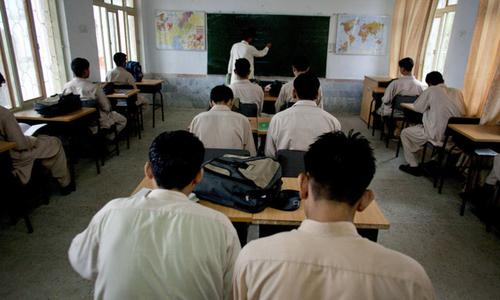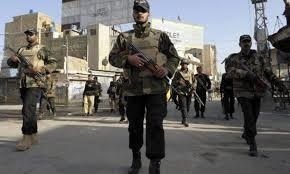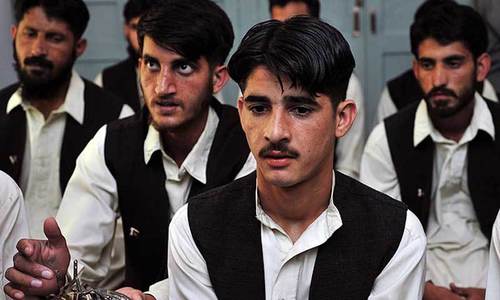MINGORA: There is nothing about the man that suggests he was once part of a ruthless killing machine. His face is haggard; his body frail. I assume he is in his late ’30s, but he is 25, he tells me, eyes fixed on something on the floor.
Eight years ago, this man was willing to kill; indeed, he trained for it. But before that, he was made to watch: men, women, young, old, children. It was justified, he was told. But children? That’s when the nightmares began. The scenes he witnessed continued to haunt him, keeping him up at nights. This is the face of a man who relives his worst nightmares every day.
Sher Muhammad, a resident of Khawazakhela, was lucky. Because his hands were clean, he is one of approximately 1,800 former militants who have been released after going through a three-month de-radicalisation and emancipation programme in Mishal Centre, Swat. The sprawling complex on the bank of the Swat River, once the Pakistan-Austrian Institute for Hotel Management, is perhaps the ideal location. Taken over by the Tehreek-i-Taliban Pakistan (TTP) in 2007 and turned into a ‘court’, it now houses an internment centre and de-radicalisation centre. The programme offers a second shot at a new life, but to be eligible, there must be no blood on the hands. For men like Sher Muhammad, Mishal represents hope.
Contrary to popular perception, not everyone that joins militancy is a committed ideologue. The psychologists at Mishal have screened hundreds of former inmates, and tell me the typical reasons why men turn into terrorists: many were coerced, some joined under peer pressure, others sought money, adventure or worse, revenge. But there are some common patterns: low IQ levels and a lack of critical thinking, ignorance and neglect in large and broken family structures, and physical abuse during childhood that led to the development of personalities that were emotionally unstable.
But some joined up for ideological reasons. Sher Muhammad decided to join after listening to a fiery radio sermon by Mullah Fazlullah. “When their campaign started, we thought they were on the right path of Islam. When I first listened to Fazlullah, I was willing to give up my life for the cause,” he says. Sher Muhammad left his family to join the TTP in the mountains, receiving training with small arms and explosives.
But as he proceeded towards inner circles, there were signs he did not like. He claims that the senior figures were addicted to power. What happened after the deal between the government and TTP served another hint. “They were never peaceful people,” he says. “Even though the government agreed to their demands, they continued to fight and spread terror.” The real eye-opener came later. “I saw them killing people who were praying in the mosque, ransacking houses with no regard for women. They destroyed the lives of many innocent people and children. The worst was when they beheaded and butchered people. It still wakes me up at night.”
Sher Muhammad had experienced what psychologists refer to as abhorrence to indiscriminate violence, a key factor that helps people disengage. “The key is to keep them busy through lectures on religion with references, so they never take someone’s word, and offer them skills to earn a livelihood,” says a psychologist here. The other key consideration is providing a respectful environment to the inmates. At Mishal,the beneficiaries can watch TV, play games and even exercise in the in-house gymnasium. Meetings with family members are arranged regularly.
Hayat teaches woodwork to inmates. He is a former inmate, but he offers little insight into his own personal life. Hayat learned woodwork during his time at the centre and set up a shop of his own with financial assistance from the programme. Now he teaches the craft. “I learned the value of life after spending time in the de-radicalisation centre. And I want others to learn it too,” he adds. His one regret is that his father could not afford to send him to school. This, he says, is going to change. His children, he promises, will become doctors and engineers.
Funding is one of the main concerns of the military administrators. Even so, this is not the only limitation of the programme — which on paper is innovative and effective. There are few trained staff members, and a lack of independent evaluation, with the military keeping tight control. And the main question is whether the inmates who are released have truly been de-radicalised. “They are released only after the guarantee of the family and community,” I am told. “They are not allowed to leave their area. There are regular checks and they are required to check in with the authorities at regular intervals.” The administrators of the programme claim the success rate is 99 per cent with very few cases of released persons going missing.
But will these people in their hearts remain true to what has been taught them? It seems so, in the case of Sher Muhammad. Now a married man, he says he wants his only daughter to go to school and have the education he could not. For a man who was once willing to blow up a school if ordered, this is the change that Mishal aims bring to many lives.
(Names have been changed to protect the identity of the persons interviewed)
Published in Dawn, March 21st, 2017















































